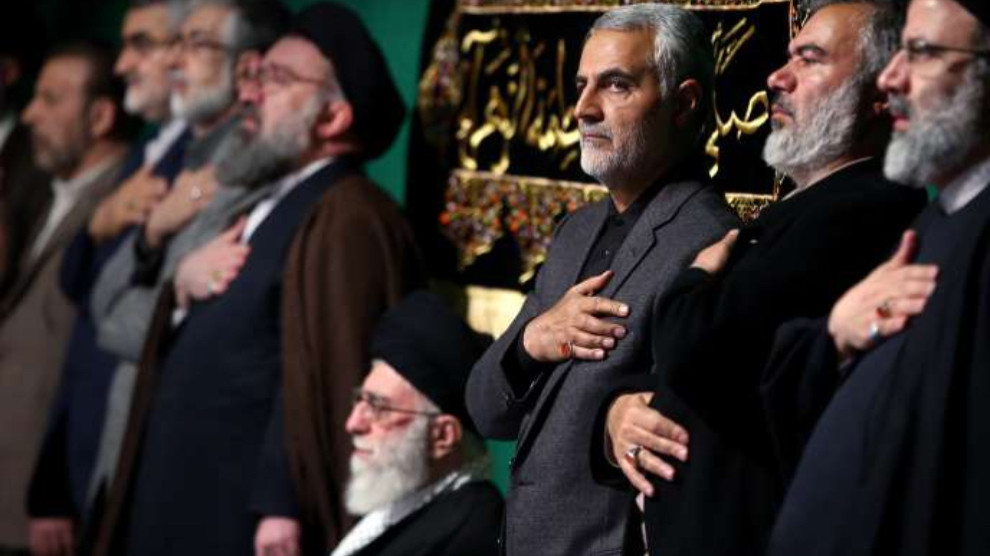Tensions rise after the US killing of Iran’s Soleimani
The US killing of Iran’s Soleimani and al-Muhandis is followed by worldwide reactions.
The US killing of Iran’s Soleimani and al-Muhandis is followed by worldwide reactions.

US President Donald Trump ordered an airstrike on January 2 that killed General Qassem Soleimani, commander of the Quds Force, the elite, external wing of the Iran’s Islamic Revolutionary Guard Corps (IRGC). The attack on Baghdad airport also killed deputy head of the Popular Mobilisation Units (Hashd al-Shaabi), Abu Mahdi al-Muhandis. Both men were traveling in the same vehicle. A second vehicle in which Hashd al-Shaabi guards were traveling was also bombed and at least 8 people were killed. Guided drones were fired from an American helicopter.
The US Department of Defense said the strike was a deterrent measure to protect American personnel abroad. This air strike is meant to deter Iran from all attack projects in the future, the Ministry of Defense said.
The United States embassy in Baghdad has called on all its citizens to depart Iraq immediately on Friday.
“Due to heightened tensions in Iraq and the region, the US embassy urges American citizens to heed the January 2020 travel advisory and depart Iraq immediately. US citizens should depart via airline while possible, and failing that, to other countries via land,” it said in a statement.
NEW GENERAL NAMED
Iran’s Supreme Leader Ayatollah Ali Khamenei appointed assassinated commander Qassem Soleimani’s deputy, Brigadier General Esmail Ghaani, to replace him as head of the country’s Quds Forces.
REACTIONS FROM MOSCOW, DAMASCUS AND HEZBOLLAH
Russia's Foreign Ministry said on Friday that the killing of Soleimani would increase tensions in the Middle East.
"We consider the killing of Soleimani as the result of an American missile strike in the vicinity of Baghdad to be a bold step that will lead to increased tension throughout the region. Soleimani was devoted to protecting Iran's national interests," RIA quoted the Foreign Ministry as saying.
Syria’s Foreign Ministry also strongly condemned the “treacherous, criminal American aggression" that led to the killing of Iranian Major-General Qassem Soleimani, state news agency SANA cited a foreign ministry source as saying on Friday.
The source said the attack constituted a "serious escalation" and reaffirmed U.S. responsibility for instability in Iraq, according to SANA.
The leader of Iran-backed militia Hezbollah in Lebanon, Hassan Nasrallah, called on "resistance fighters" around the world to punish those responsible for the killing of top Iranian commander.
LONDON AND CHINA CALL FOR DE-ESCALATION AND RESTRAINT
The UK's foreign minister has issued a brief statement in response to the killing of Soleimani, saying that the threat of further conflict is in "none of our interests."
Dominic Raab's statement reads: “We have always recognized the aggressive threat posed by the Iranian Quds force led by Qassem Soleimani. Following his death, we urge all parties to de-escalate. Further conflict is in none of our interests.”
"China has always opposed the use of force in international relations," Chinese foreign ministry spokesman Geng Shuang said at a daily press briefing.
"We urge the relevant sides, especially the United States, to remain calm and exercise restraint to avoid further escalating tensions."
He added that Iraq's sovereignty, independence and territorial integrity must be respected.
"We have woken up to a more dangerous world," Amelie de Montchalin, France's Europe Minister, told French radio, saying President Emmanuel Macron would consult soon with players in the region.
"In such operations, we can see an escalation is under way, but what we want above all is stability and de-escalation," Montchalin said.
HOUTHI CALL FOR QUICK RETALIATION
Muhammad al-Husi from the political bureau of the Iranian-backed Houti militia of Yemen condemned the killing of Iranian general and suggested a quick and direct retaliation as a solution. The militia had taken control of a large part of the country, including capital Sana, in 2014. According to the United Nations, the humanitarian crisis in Yemen remains the worst in the world.
NETANYAHU RETURNS TO ISRAEL
Israel’s Prime Minister Benjamin Netanyahu cut short his trip to Greece following the assassination of the Iranian general. Netanyahu was in Athens following the deal signed by Greece, Cyprus and Israel on Thursday to build a 1,900 km (1,180 mile) subsea pipeline to carry natural gas from the eastern Mediterranean’s rapidly developing gas fields to Europe.
On the other hand, Israeli army Friday closed a ski resort in the annexed Golan Heights following a security assessment. The ski resort lies in the Israeli-controlled part of the Golan Heights, which was seized from Syria in the Six-Day War of 1967 and later annexed in a move still not recognised by most of the international community.
SISTANI: ATTACK A BREACH OF IRAQI SOVEREIGNTY
Iraq’s top Shiite cleric Ali al-Sistani called on all parties to practice restraint.
"The vicious attack on Baghdad international airport last night is an insolent breach of Iraqi sovereignty and international agreements," Sistani's office said in a statement.
"These events and more indicate the country is heading towards very difficult times. We call on all concerned parties to behave with self-restraints and act wisely," he said.